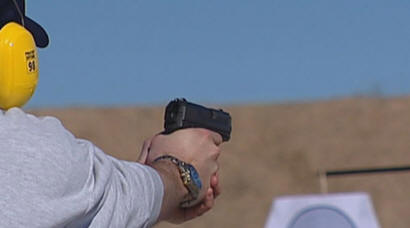|
|||||||||||||||||
|
|
|
|||
|
FFDOA President
Advocates For Armed Pilots In And Out Of The Cockpit By Daniel Baxter |
||||
 |
January 30, 2012 - Marcus Flagg, President of the Federal Flight Deck Officer Association (FFDOA), in a radio interview advocated that pilots that have been certified by the Federal Flight Deck Officer (FFDO) program be able not only to carry a handgun in the cockpit but be allowed to carry their firearm concealed on their person to and from work. In addition, Flagg is requesting that the Transportation Security Administration (TSA) expand the Federal Flight Deck Officer program funding which would allow more pilots to participate in the program and be certified Federal Flight Deck Officers. Currently the TSA program is turning pilots away due to lack of funds for training and certifying pilots as FFDOs. Flagg testified before congress in November 2011 (see testimony) stating that FFDOs provide five times the coverage of the Federal Air Marshal Service at 1/25th the cost. The cost of each Federal Air Marshal is around $3,300 per flight. A pair of FAMs cost roughly $6,600 per flight. FFDOs cost roughly $15 per flight. Comparing the two, the same expenditure allows 440 FFDO missions to the single FAM mission. Which program is more cost effective? Marcus Flagg is a United States Naval Academy graduate, a former Navy fighter pilot and a graduate of the Naval Post-Graduate School on Aviation Safety. He is currently an airline pilot with UPS Airlines. |
|||
|
On
September 11, 2001, Flagg?s father Bud Flagg and his mother Dee
Flagg died aboard American Airlines flight #77, when it was
commandeered by terrorists and crashed into the Pentagon. Since
2001, Flagg has been proactive in improving aviation security to
help protect our country against terrorism. Flagg serves as
President for Federal Flight Deck Officers Association (FFDOA),
a not-for-profit and non-compensated trade association. FFDOA represents Federal Flight Deck Officers (armed pilots), which now ranks the fourth largest Federal Law Enforcement organization in the United States. The FFDO program is an extremely viable, cost effective, and successful element of our national aviation security effort today. |
||||
|
The FFDOA is a
non-profit association which advocates on behalf of its member pilots.
The association provides a unified voice to Congress and government
agencies on issues relevant to cockpit and passenger safety and
security. The Federal Flight Deck Officer (FFDO) program is run by the
Federal Air Marshal Service with the aim of allowing select pilots of
commercial airline flights to carry firearms.
Following the
September 11 attacks in 2001, the Arming Pilots Against Terrorism Act,
part of the Homeland Security Act of 2002, directed the Transportation
Security Administration to develop the Federal Flight Deck Officer
program as an additional layer of security.
There are some who
advocate that if a pilot carried his gun outside the cockpit that a
passenger could disarm the pilot of his weapon. However, Flagg said,
"Yes, there is that possibility but you're trained to protect against
that."
Upon completion of
the Federal Flight Deck Officer program, eligible flight crew members
are deputized Federal Law Enforcement Officers authorized by the
Transportation Security Administration to use firearms to defend against
acts of criminal violence or air piracy undertaken to gain control of
their aircraft.
A flight crew
member may be a pilot, flight engineer or (if this obsolete position
existed today) navigator assigned to the flight. Participants in the
program are meant to remain anonymous, and while armed, are prohibited
from sharing their participation except with select personnel on a need
to know basis.
Federal Flight
Deck Officers are sworn and deputized Federal Law Enforcement officers
commissioned by the Department of Homeland Security/ TSA Law Enforcement
Division.
On March 24, 2008,
a US Airways pilot's gun accidentally went off on Flight 1536 from
Denver to Charlotte, North Carolina. The pilot was a Federal Flight Deck
Officer and was authorized to carry the weapon by the US Transportation
Security Administration. No one was injured and the aircraft landed
safely.
On January 13,
2011, a JetBlue pilot's bag carrying his gun was accidentally picked up
by a passenger flying to West Palm Beach, Florida. When the passenger
realized the bag wasn't his, he immediately notified a flight attendant.
To be eligible to
volunteer for and participate in the Federal Flight Deck Officer program
you must:
- Have and
maintain a current FAA Airman's certificate. |
|
|
| blog comments powered by Disqus |
 |
| ?AvStop
Online Magazine
Contact
Us
Return To News
|
|

